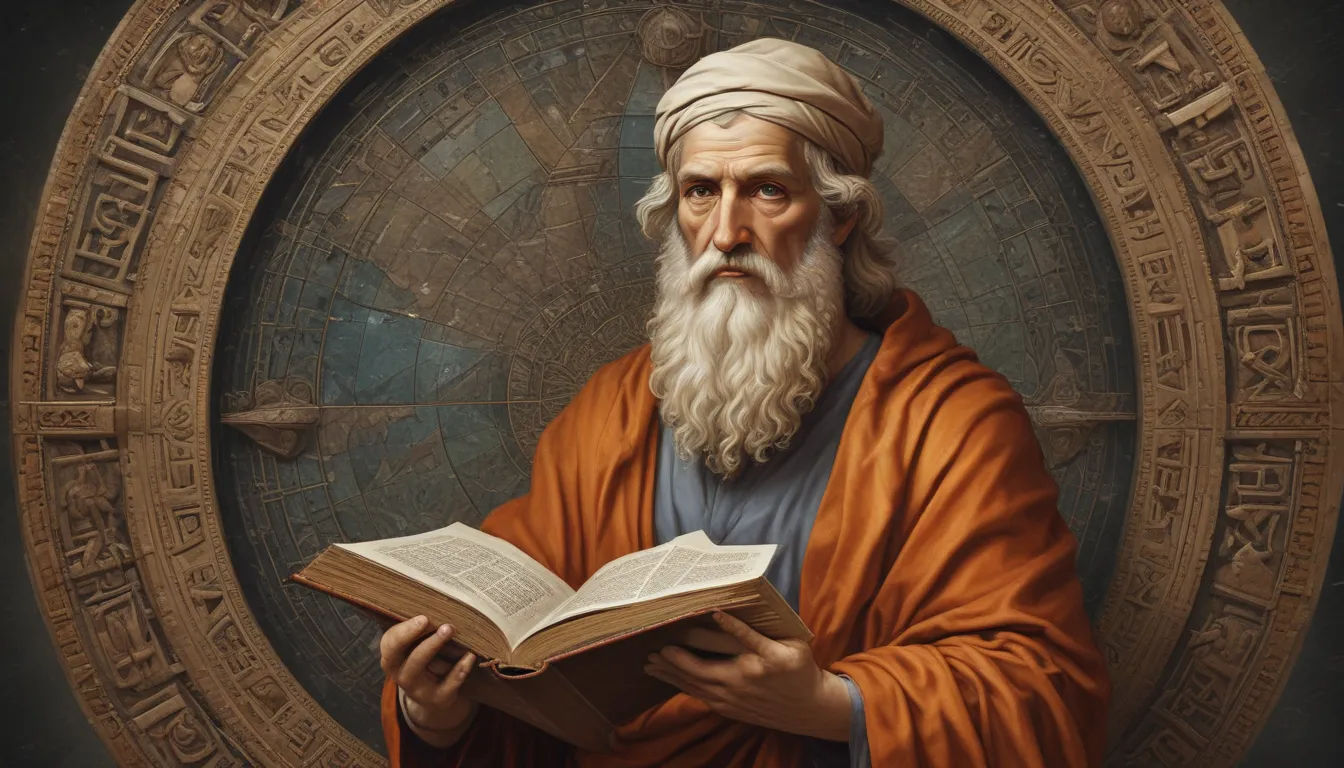The images in our articles may not match the content exactly. They are used to grab your attention, not to show the exact details in the text. The images complement the text but do not replace it.
Welcome to the mystical world of Pythagoras, where mathematics, philosophy, and spirituality intertwine to create a legacy that has endured for centuries. Pythagoras, an ancient Greek philosopher and mathematician, is renowned for his groundbreaking contributions to various fields of study. Beyond his famous theorem, Pythagoras’s beliefs, teachings, and influential role in the development of Western philosophy have left an indelible mark on history. Join us as we journey back in time to unravel the enigmatic life of this remarkable ancient thinker and explore 14 intriguing facts that shed light on his achievements, beliefs, and legacy.
Unveiling the Life of Pythagoras
Pythagoras, born around 570 BCE, was not just a mathematician but also a philosopher, credited with many important discoveries in both fields. His legacy is deeply rooted in his foundational work in geometry and mathematics, which paved the way for countless advancements in these disciplines.
The Pythagorean Theorem: A Cornerstone of Mathematics
Pythagoras is perhaps best known for the Pythagorean Theorem, which states that in a right-angled triangle, the square of the length of the hypotenuse is equal to the sum of the squares of the other two sides. This theorem finds applications in various fields and continues to be a fundamental concept in geometry.
The Formation of the Pythagorean Brotherhood
Pythagoras’s influence extended beyond mathematical principles. He founded the Pythagorean Brotherhood, a community that combined the study of mathematics, philosophy, and religious rituals. This organized educational institution was a precursor to modern-day schools.
The Spiritual Teachings of Pythagoras
Pythagoras’s beliefs extended beyond the realm of mathematics to encompass spiritual and philosophical concepts. He believed in the transmigration of souls, where the soul is immortal and experiences multiple births and deaths. This concept influenced his broader philosophical and spiritual teachings.
Harmony of the Spheres: A Cosmic Perspective
Pythagoras proposed the theory of the harmony of the spheres, suggesting that celestial bodies emitted musical sounds as they moved through space, creating a harmonious cosmic order. This belief in the interconnectedness of the universe resonates with his broader spiritual teachings.
Numbers as the Essence of All Things
Central to Pythagoras’s philosophy was the concept of numbers as the essence of all things. He viewed numbers not only as quantities but also as symbols with mystical and spiritual significance, reflecting a deep connection between mathematics and spirituality.
The Influence on Music Theory
Pythagoras’s contributions to music theory were equally significant. He discovered mathematical relationships between musical intervals and developed the Pythagorean tuning system, which influenced the evolution of Western music. His insights continue to shape musical composition and theory.
Embracing a Harmonious Lifestyle
Pythagoras advocated for a simple and harmonious way of life, emphasizing the importance of balance, simplicity, vegetarianism, and ethical virtues. His teachings on living in harmony with oneself and the universe reflect his holistic approach to philosophy and spirituality.
The Mystique Surrounding Pythagoras
Pythagoras’s life was shrouded in mystery and legend, with tales of supernatural powers and mystical abilities. From communicating with animals to controlling natural forces, his mythical reputation adds to the allure of his enigmatic persona.
The Enduring Legacy: Influencing Philosophers Throughout History
Pythagoras’s ideas had a profound impact on subsequent philosophers and scientists, including influential figures like Plato and Aristotle. His theories laid the groundwork for diverse branches of mathematics and philosophy, shaping the intellectual landscape for generations to come.
Unraveling the Secrets of Mathematics Through Pythagoras
Pythagoras believed that the pursuit of knowledge through mathematics led to a deeper understanding of the universe. He considered mathematics to be a pathway to divine truth and wisdom, inspiring future generations to explore the mysteries of the cosmos through numerical exploration.
Preserving Geometric Principles for Future Generations
Pythagoras’s contributions to geometry endure to this day, with principles like the Pythagorean theorem and geometric proofs continuing to be foundational concepts in mathematics education. His geometric insights have stood the test of time, enriching the understanding of geometric relationships and shapes.
Inspiring Mystical and Esoteric Traditions
Pythagoras’s ideas on the spiritual significance of numbers and the interconnectedness of the universe have resonated with mystical and esoteric traditions throughout history. His teachings continue to inspire seekers of spiritual wisdom and enlightenment, offering a unique perspective on the nature of reality.
Unveiling the Enigma of Pythagoras
Despite the mysterious nature of Pythagoras’s teachings and the lack of written records directly from him, his contributions to mathematics, philosophy, and spirituality have left an enduring legacy. His work continues to captivate scholars and enthusiasts alike, serving as a testament to the timeless allure of his ideas and beliefs.
FAQ
-
Who was Pythagoras?
Pythagoras was an ancient Greek mathematician and philosopher known for his contributions to geometry and the development of the Pythagorean theorem. -
What is the Pythagorean theorem?
The Pythagorean theorem states that in a right-angled triangle, the square of the length of the hypotenuse is equal to the sum of the squares of the other two sides. -
What were Pythagoras’s beliefs?
Pythagoras believed in a harmonious universe where everything is connected through numbers and ratios. He also espoused the concept of the transmigration of souls, suggesting the immortality of the soul through reincarnation. -
What impact did Pythagoras have on mathematics?
Pythagoras made significant contributions to mathematics, particularly in geometry. His work laid the foundation for the study of triangles, geometric proofs, and the exploration of irrational numbers. -
Are there other famous theorems attributed to Pythagoras?
While the Pythagorean theorem is his most famous contribution, Pythagoras and his followers made several other significant mathematical discoveries, contributing to the development of mathematical principles.
Conclusion
Pythagoras’s enduring legacy as an ancient mathematician and philosopher continues to captivate individuals across the globe. His profound insights into geometry, mathematics, and spirituality have shaped the intellectual landscape for centuries, inspiring future generations to explore the mysteries of the universe through the lens of numerical exploration and philosophical inquiry.
By unraveling the enigmatic world of Pythagoras, we gain a deeper appreciation for the interconnectedness of mathematics and philosophy, as well as the timeless relevance of his teachings in contemporary society. Let us continue to explore the legacy of Pythagoras and uncover the enduring wisdom embedded in his mystical and mathematical contributions to human knowledge and understanding.






